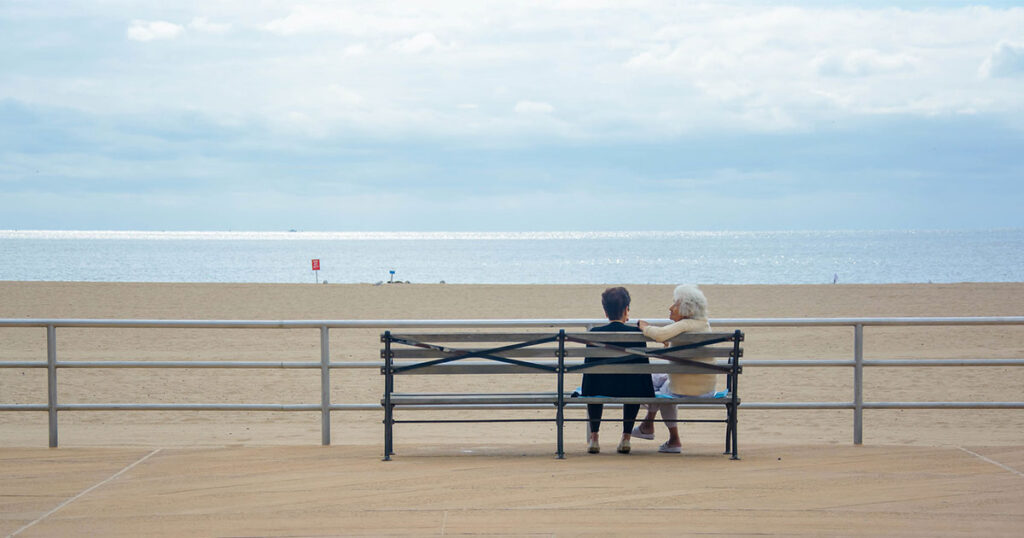
While walking down the lane where I live to run an errand in town, or on my return from completing one, I often find my elderly neighbor seated on the bench at the side of her house, a strategic spot for watching the comings and goings on the street, and I always stop to greet her. In nice weather, an old friend of hers who lives a couple of blocks away often shows up around noon to share my neighbor’s bench. Side-by-side they sit, both in their 90s, both thin with rounded shoulders, both wizened. Two peas in a pod, you could say. In Spanish it’s dos gotas de agua, two drops of water. They even have the same name, Consuelo, though my neighbor goes by Concha and her friend by Conchita.
But look a little closer and differences appear. The friend, Conchita, comes on her own steam, though her caretaker’s arm steadies her. Concha needs no one’s arm but does rely on her two forearm crutches to hobble her 50 meters up or down the lane. Conchita’s hair is thin and pure white; Concha’s is thinning and dyed a reddish brown. Conchita wears nice slacks and a wool jacket with gleaming buttons, and now, in summer, a straw hat, looking as if she were on parade. Concha wears a polar fleece over a housecoat, and on her feet are slippers. I’ve never seen her in a hat, or seen Conchita without one. Concha has family who come to check on her and lend a hand. Conchita has a caretaker, a very energetic and cheerful woman who chats with her charge while guiding her slowly along the lane, commenting on the weather or the flowers, often remarking on the differences between Castilian Spanish and the Spanish of Colombia, where she is from and where she lived until immigrating to Spain two years ago. Her name is not María, but that’s what she goes by because Conchita cannot pronounce her real name.
Often María and Conchita walk on past Concha’s house all the way to the end of the dead-end lane, just beyond my house, turn around, and head back, and from my living room or my patio I hear María’s singsong voice as she comments on what she sees or engages her charge’s interest with a question. María appears to be interested in everything. She is a different pea from a different pod. Her accent, her life’s experiences, her job, her determined cheer. It’s not that the older two women complain, but they seem braced for whatever misfortune is in store. A lifetime of hard work and hard times along with the good times has made them wary. They make no fuss about difficulties, but they also take no special delight in an exceptionally fine day, a funny coincidence, or a spot of good news.
Concha has a daughter, a son-in-law, and four grandchildren. The grandchildren drop in from time to time and seem very loving. Until this year, Concha also had a son, who shared the bulk of the caretaking with his sister. In late May, he died, both unexpectedly and yet not surprisingly because, as neighbors said, shaking their heads sadly, he did not take care of himself. He was 61. On my first encounter with Concha after his death, Conchita and María were sitting beside her on the bench. What would I say, how would I bring the subject up? Four days had passed. I approached, a little solemnly, wondering how to phrase what needed to be said. A small dog I had never seen before was on Concha’s lap, looking around timidly, and I asked, “Who is this?”
“It’s Sonya’s,” Concha said, looking right at me, her eyes suddenly full of tears. Tears for the changes, including the dog that had been left temporarily in her company to cheer her, I supposed, while the owner, a granddaughter, either the niece or the daughter of the deceased son, saw to tasks having to do with the death. No need for me to introduce the subject because it was already in the air. “I’m so sorry,” I said, and put my hand on hers. María shook her head sadly and sighed, murmuring that it was terrible, terrible. Conchita said nothing. Concha, eyes full, said, “What are you going to do.”
Conchita, too, has children. I don’t know where they all are or what role they play in her life. This particular heartache Conchita might never have known. But take a step back, and we’re all peas, we’re all drops of water, like our tragedies, just drops in a bucket.


